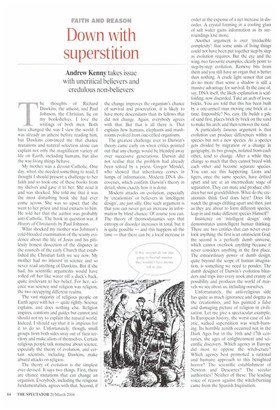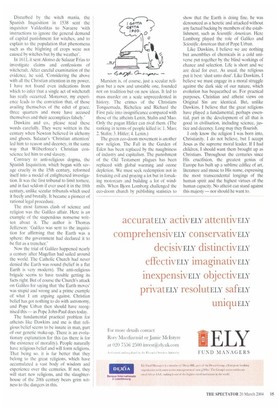Down with superstition
Andrew Kenny takes issue with uncritical believers and credulous non-believers The thoughts of Richard Dawkins. the atheist, and Paul Johnson, the Christian. lie on my bookshelves. I love the writings of both men. Both have changed the way I view the world. 1 was already an atheist before reading him, but Dawkins convinced me that chance mutations and natural selection alone can explain not only the magnificent variety of life on Earth, including humans, but also the way living things behave, My mother was a devout Catholic. One day, when she needed something to read, I thought I should present a challenge to her faith and so took one of these hooks from my shelves and gave it to her. She read it and was shocked. She told me that it was the most disturbing book she had ever come across. She was so upset that she went to her priest and read extracts to him. He told her that the author was probably anti-Catholic. The book in question was A History of Christianity by Paul Johnson.
What shocked my mother was Johnson's cold-blooded examination of the scanty evidence about the life of Jesus and his pitilessly honest dissection of the disputes in the councils of the early Church that established the Christian faith we see now. My mother had no interest in science and so never read anything of Dawkins. But if she had, his scientific arguments would have rolled off her like water off a duck's back, quite irrelevant to her belief. For her, science was science and religion was religion, the two occupying different realms.
The vast majority of religious people on Earth agree with her — quite rightly. Science explains, and does nothing else. Religion inspires, comforts and guides but cannot and should not try to explain the natural world. Indeed, I should say that it is impious for it to do so. Unfortunately, though, small groups from both sides stray out of their territory and make idiots of themselves. Certain religious people talk nonsense about science, especially the theory of evolution, and certain scientists, including Dawkins. makc absurd attacks on religion.
The theory of evolution is the simplest ever devised. It says two things. First, there are chance mutations that can change an organism. Everybody, including the religious fundamentalists, agrees with that. Second, if
the change improves the organism's chance of survival and procreation, it is likely to have more descendants than its fellows that did not change. Again, everybody agrees with that. But that is all there is. That explains how humans, elephants and mushrooms evolved from one-celled organisms.
The greatest challenge ever to Darwin's theory came early on when critics pointed out that any change would be blended away over successive generations. Darwin did not realise that the problem had already been solved by a priest, Gregor Mendel, who showed that inheritance comes in lumps of information. Modern DNA discoveries, which confirm Darwin's theory in detail, show exactly how it is done.
Modern attacks on evolution, especially by 'creationists' or believers in 'intelligent design", are just silly. One such argument is that you can never get an increase in information by blind chance. Of course you can. The theory of thermodynamics says that entropy or disorder increases in total, but it is quite possible — and this happens all the time — that there can be a local increase in order at the expense of a net increase in disorder. A crystal forming in a cooling glass of salt water gains information as its surroundings lose more.
Another argument is over 'irreducible complexity': that some units of living things could not have been put together step by step as evolution requires. But the eye and the wing, two favourite examples, clearly point to step-by-step evolution. Remove bits from them and you still have an organ that is better than nothing. A crude light sensor that can do no more than sense a shadow is still a massive advantage for survival. In the case of. say, DNA itself, the likely explanation is scaffolding, now discarded. Take an arch of loose bricks. You are told that this has been built by a one-armed man moving one brick at a time. Impossible? No, easy. He builds a pile of sand first, places brick by brick on the sand to make his arch, and then removes the sand.
A particularly fatuous argument is that evolution can produce differences within a species but not a new species. As a species gets divided by migration or a change in geography, its two groups, isolated from each other, tend to change. After a while they change so much that they cannot breed with each other and become separate species. You can see this happening. Lions and tigers, once the same species, have drifted apart and are at an intermediate stage of separation. They can mate and produce children but not grandchildren. What do the creationists think God does here? Does He watch the groups drifting apart and then, just as they are about to form different species, leap in and make different species Himself?
Insistence on 'intelligent design' only demonstrates unintelligent human thinking. There are two entities that can never overlook anything: the first is an omniscient God; the second is a perfectly dumb universe, which cannot overlook anything because it never considers anything in the first place. The extraordinary power of dumb design, quite beyond the scope of human imagination, is something we need to ponder. The dumb designer of Darwin's evolution blunders and trips into every nook and cranny of possibility and produces the world of marvels we see about us, including ourselves.
Unfortunately, the anti-religious side has quite as much ignorance and dogma as the creationists, and has painted a false and damaging picture of religion in civilisation. Let me give a spectacular example. In European history, the worst case of idiotic, wicked superstition was witch-burning. Its horrible zenith occurred not in the Dark Ages but in the 16th and 17th centuries, the ages of enlightenment and scientific discovery. Which agency in Europe did most to oppose the witch-craze? Which agency best promoted a rational and humane approach to this benighted horror? The scientific establishment of Newton and Descartes? The secular authorities? Neither of these. The leading voice of reason against the witch-burning came from the Spanish Inquisition. Disturbed by the witch mania, the Spanish Inquisition in 1538 sent the inquisitor Valdeolitas to Navarre 'with instructions to ignore the general demand of capital punishment for witches, and to explain to the population that phenomena such as the blighting of crops were not caused by witches but by the weather'.
In 1611, it sent Alonso de Salazar Frias to investigate claims and confessions of witchcraft. After careful examination of the evidence, he said, 'Considering the above with all the Christian attention in my power, I have not found even indications from which to infer that a single act of witchcraft has really occurred. Moreover, my experience leads to the conviction that, of those availing themselves of the edict of grace, three quarters and more have accused themselves and their accomplices falsely.'
Dawkins and co., please read these words carefully. They were written in the century when Newton believed in alchemy and ghosts. Salazar's 'Christian attention' led him to reason and decency, in the same way that Wilberforce's Christian conscience led him to end slavery.
Contrary to anti-religious dogma, the Spanish Inquisition, which began with savage cruelty in the 15th century, reformed itself into a model of enlightened investigation. It was the first tribunal to limit torture, and in fact seldom if ever used it in the 18th century, unlike secular tribunals which used it freely and brutally. It became a pioneer of rational legal procedure.
The most famous clash of science and religion was the Galileo affair. Here is an example of the stupendous nonsense written about it. The author is Thomas Jefferson: 'Galileo was sent to the inquisition for affirming that the Earth was a sphere: the government had declared it to be flat as a trencher.'
Now the trial of Galileo happened nearly a century after Magellan had sailed around the world. The Catholic Church had never denied the Earth was round (belief in a flat Earth is very modern). The anti-religious brigade seems to have trouble getting its facts right. But of course the Church's attack on Galileo for saying that 'the Earth moves' was stupid and wrong and a prime example of what I am arguing against. Christian belief has got nothing to do with astronomy, and Pope Urban then should have recognised this — as Pope John-Paul does today.
The fundamental practical problem for atheists like Dawkins and me is that religious belief seems to be innate in man, part of our genetic make-up. There is an evolutionary explanation for this (as there is for the existence of morality). People naturally have religious belief and will form religions. That being so. it is far better that they belong to the great religions, which have accumulated a vast body of wisdom and experience over the centuries. If not, they will start new religions, and the slaughterhouse of the 20th century bears grim witness to the dangers in this, Marxism is, of course, just a secular religion but a new and unstable one, founded not on tradition but on new ideas. It led to mass murder on a scale unprecedented in history. The crimes of the Christians Torquemada, Richelieu and Richard the First pale into insignificance compared with those of the atheists Lenin, Stalin and Mao. Only the pagan Hitler can rival them. (The ranking in terms of people killed is: 1. Mao; 2. Stalin; 3. Hitler; 4. Lenin.) The green eco-doom movement is another new religion. The Fall in the Garden of Eden has been replaced by the naughtiness of industry and capitalism. The punishment of the Old Testament plagues has been replaced with global warming and ozone depletion. We must seek redemption not in forsaking evil and praying a lot but in forsaking motorcars and building a lot of windmills. When Bjorn Lomborg challenged the eco-doom church by publishing statistics to
show that the Earth is doing fine, he was denounced as a heretic and attacked without any factual backing by members of the establishment, such as Scientific American. Here Lomborg played the role of Galileo and Scientific American that of Pope Urban.
Like Dawkins, I believe we are nothing but assemblies of chemicals in a cold universe put together by the blind workings of chance and selection. Life is short and we are dead for ever. As usual, the religious put it best: 'dust unto dust'. Like Dawkins, I believe we must engage in a moral struggle against the dark side of our nature, which evolution has bequeathed us. For practical purposes, Christian and atheist views on Original Sin are identical. But, unlike Dawkins, I believe that the great religions have played a fundamental, perhaps essential, part in the development of all that is good in civilisation, including science, justice and decency. Long may they flourish.
I only know the religion I was born into, Christianity. I do not believe, but I accept Jesus as the supreme moral leader. If! had children. I should want them brought up as Christians. Throughout the centuries since His crucifixion, the greatest genius of Europe has built up a sublime edifice of art, literature and music to His name, expressing the most transcendental longings of the human spirit and the highest virtues of the human capacity. No atheist can stand against this majesty — nor should he want to.



















































































 Previous page
Previous page